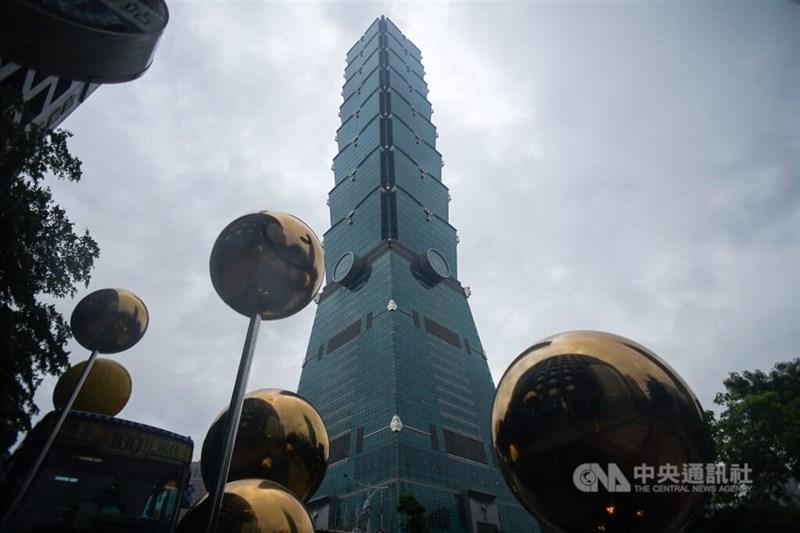Taiwan has risen two spots to sixth place in this year's IMD World Competitiveness Ranking, outperforming 63 of the 69 economies surveyed.
Taiwan also retained its position as the world's most competitive economy among economies with populations of more than 20 million for the fifth consecutive year, said the annual report released today by the Switzerland-based International Institute for Management Development (IMD).
The index takes into consideration four factors — economic performance, government efficiency, business efficiency and infrastructure — each of which have five sub-factors based on different criteria.

Photo: CNA
Taiwan's overall improvement in the rankings was attributed to a significant jump in the economic performance category, in which it moved up 16 spots to 10th position, the report said.
Taiwan continued to fare well in the other three categories, moving up two spots to fourth in business efficiency, and maintaining its eighth spot in government efficiency and 10th position in infrastructure.
Taiwan's jump in economic performance was largely due to its jump from 13th to fourth position in the "domestic economy" sub-factor.
That, in turn, was driven by indicators such as real GDP growth per capita, in which Taiwan rose 28 spots to fourth globally, reaching 4.68 percent.
In the international trade sub-factor, Taiwan climbed from 48th to 30th, bolstered by growth in goods exports, in which it ranked eighth with an increase of 9.72 percent, and services exports, in which it placed 28th with an increase of 8.95 percent.
The report cited challenges Taiwan would face in this year, which it said were provided by the National Development Council.
Among them were the nation's need to "deepen international cooperation to enhance strategic positioning in the global value chain," "diversify export markets ... to strengthen economic resilience" and "integrate AI [artificial intelligence] with industries to enhance productivity and competitiveness."
The council said the government would continue to use the IMD ranking as a reference for policy reform, particularly in the face of global uncertainties such as the US' tariff policies.

BYPASSING CHINA TARIFFS: In the first five months of this year, Foxconn sent US$4.4bn of iPhones to the US from India, compared with US$3.7bn in the whole of last year Nearly all the iPhones exported by Foxconn Technology Group (富士康科技集團) from India went to the US between March and last month, customs data showed, far above last year’s average of 50 percent and a clear sign of Apple Inc’s efforts to bypass high US tariffs imposed on China. The numbers, being reported by Reuters for the first time, show that Apple has realigned its India exports to almost exclusively serve the US market, when previously the devices were more widely distributed to nations including the Netherlands and the Czech Republic. During March to last month, Foxconn, known as Hon Hai Precision Industry

Taiwan Semiconductor Manufacturing Co (TSMC, 台積電) and the University of Tokyo (UTokyo) yesterday announced the launch of the TSMC-UTokyo Lab to promote advanced semiconductor research, education and talent development. The lab is TSMC’s first laboratory collaboration with a university outside Taiwan, the company said in a statement. The lab would leverage “the extensive knowledge, experience, and creativity” of both institutions, the company said. It is located in the Asano Section of UTokyo’s Hongo, Tokyo, campus and would be managed by UTokyo faculty, guided by directors from UTokyo and TSMC, the company said. TSMC began working with UTokyo in 2019, resulting in 21 research projects,

Ashton Hall’s morning routine involves dunking his head in iced Saratoga Spring Water. For the company that sells the bottled water — Hall’s brand of choice for drinking, brushing his teeth and submerging himself — that is fantastic news. “We’re so thankful to this incredible fitness influencer called Ashton Hall,” Saratoga owner Primo Brands Corp’s CEO Robbert Rietbroek said on an earnings call after Hall’s morning routine video went viral. “He really helped put our brand on the map.” Primo Brands, which was not affiliated with Hall when he made his video, is among the increasing number of companies benefiting from influencer

Quanta Computer Inc (廣達) chairman Barry Lam (林百里) yesterday expressed a downbeat view about the prospects of humanoid robots, given high manufacturing costs and a lack of target customers. Despite rising demand and high expectations for humanoid robots, high research-and-development costs and uncertain profitability remain major concerns, Lam told reporters following the company’s annual shareholders’ meeting in Taoyuan. “Since it seems a bit unworthy to use such high-cost robots to do household chores, I believe robots designed for specific purposes would be more valuable and present a better business opportunity,” Lam said Instead of investing in humanoid robots, Quanta has opted to invest